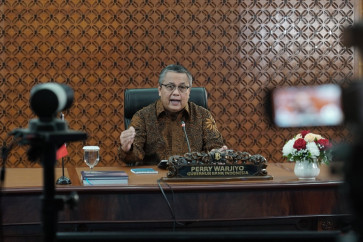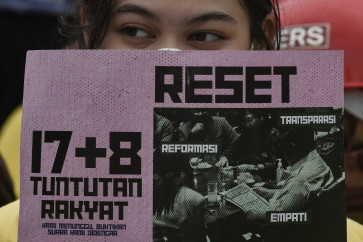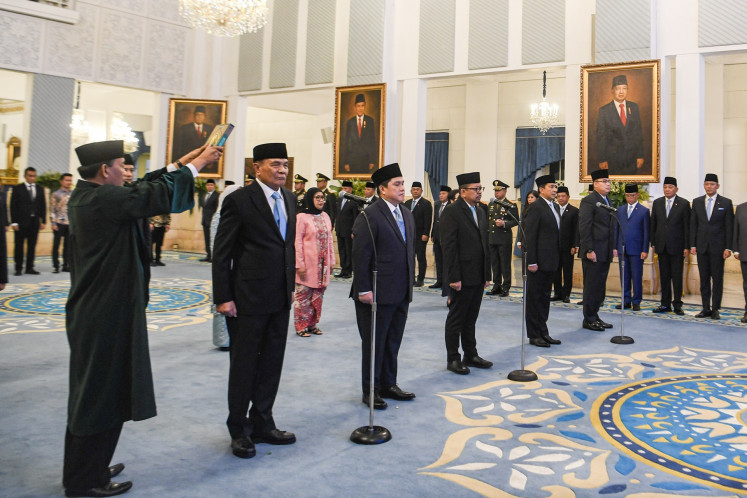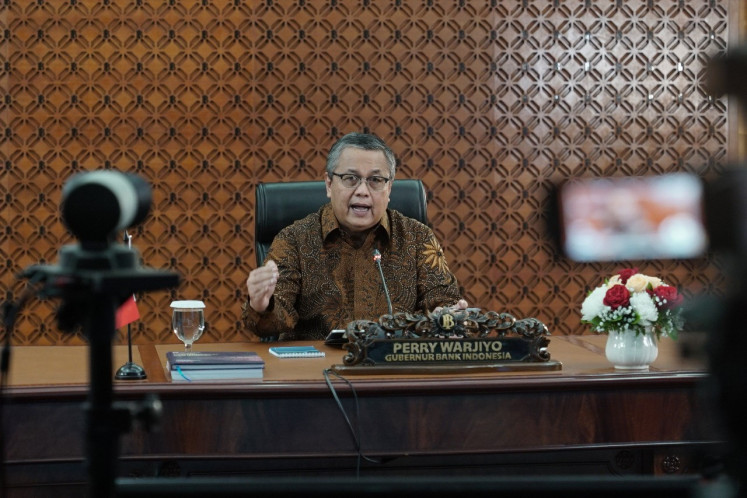Popular Reads
Top Results
Can't find what you're looking for?
View all search resultsPopular Reads
Top Results
Can't find what you're looking for?
View all search resultsIt’s time to flesh out the reform agenda
The People’s Consultative Assembly (MPR), the joint session of the House of Representatives and the Regional Representatives Council, is moving to reinstate the New Order’s broad State Policy Guidelines (GBHN), which signals a renewed interest in the old model of constitutional arrangements where the MPR sits at the apex of the system
Change text size
Gift Premium Articles
to Anyone
T
he People’s Consultative Assembly (MPR), the joint session of the House of Representatives and the Regional Representatives Council, is moving to reinstate the New Order’s broad State Policy Guidelines (GBHN), which signals a renewed interest in the old model of constitutional arrangements where the MPR sits at the apex of the system.
This means the MPR is being resurrected in its former role as a suprabody in the hierarchy of the Indonesian political system. In addition, it features a carrot-and-stick approach in which the executive is subject to, in the worst-case scenario, removal from office. In fact, as this newspaper noted, it will be one of the main features of the upcoming fifth constitutional amendment.
Unfortunately, the effort of putting the MPR back on the map is just the latest in a series of regressive political discourses that are unwittingly leading to the resurrection of a political system that we all previously rejected.
As far as the constitutional debate is concerned, I suspect that the debate’s trajectory has moved toward romanticizing the good old days. In honor all of the casualties and the hard work that this nation has put in, it must be noted that this trajectory is perilous and may eventually undo a series of hard-earned post-1998 achievements in institutional reform.
For a start, it is understandable for one to lament that after almost two decades of democracy-building we end up with nothing but a “low quality” or “nominal” democracy. This is a far cry from the archetypes of the reform era that aimed for a new Indonesia free from “Korupsi, Kolusi, [and] Nepotisme” that hallmarked the New Order’s bankruptcy.
Supposedly, the reform regime had something different to offer in delivering us from the New Order’s evils. Unfortunately, our current constitutional debate thus far has focused itself on flushing out the non-substantive issues rather than fleshing out reform itself as our agenda.
Specifically, the on-and-off efforts in constitutional development have produced nothing but a degree of confusion to the point where the ideals of reform itself are negated as in the case of the rights of religious minorities. For instance, as Andrew Ellis of the National Democratic Institute noted, the debate surrounding constitutional drafting is “what is in the bottle does not always match what is on the label”. It should not be a surprise, therefore, that the post-1998 constitutional jurisprudence of the much-revered Constitutional Court is ambivalent at best with respect to the creation of a genuine state-based law (rechsstaat).
For sure, the above challenges should not be seen as the glass being half empty. Rather, the fact that we have sustained our democratic way of life for over a decade is a considerable feat of constitutional engineering in itself but it is by no means true that we cannot achieve more. More importantly, this should not be viewed as an excuse to return to the elusive golden age which is nothing but a sign of intellectual fatigue.
For that matter, this time around, there has to be another kick-start to a free and yet rigorous rational debate about fleshing out the agenda of reform. Meaning, we need to take a more substantive turn in our constitutional-drafting debate. For instance, it should be decided from the very beginning that the discussion is open and myth-free in nature.
Specifically, there has been a popularly held myth among constitutional scholars that a constitution ought to be difficult to change, short and abstract in nature, among other things. On the contrary, Tom Ginsburg’s empirical study that studied all national constitutions written since 1789 confirms that the best constitution is usually more flexible, inclusive and detailed. Therefore, it is expected that the resulting impact opens up richer offerings that are geared toward a result-oriented process.
Another aspect that has been relatively overlooked in the previous amendment process is public participation. More specifically, there has to be much deliberation in regard to how to get the participation of the public in the process. In fact, at a global level this aspect has become increasingly popular in this century. This aspect is worth considering as it may substantially enhance the Constitution’s legitimacy, which in turn may affect its longevity.
An important point that needs to be kept in mind is that drafting a constitution is mostly about making institutional choices. There is no right or wrong for that matter. Nevertheless any decision that one may make should be well-informed.
Naturally, in the “idea-generating stage” it may be preferable to be designed in such a way so it can benefit from the success stories of other democracies, especially South Africa. In addition to preventing us from starting from scratch, comparative insights help us considerably in avoiding making the same mistakes.
No less important is the inclusion of Indonesia’s explicit stance in regard to foreign norms, especially international law. The emerging global practices, especially among the post-authoritarian states, have revealed that international law is being viewed as a “safety net” in case a domestic legal system fails.
Supposedly, international law in this case can help in “locking in” democracy at the domestic level. This means as a “pre-commitment device”, international law supports the very function of a constitution, i.e. binding and limiting the options of power-holders in decision-making.
Suffice it to say that the upcoming fifth constitutional amendment should not turn into another fiasco. As a matter of fact, it should be seen as an epoch-making opportunity to show the outside world and the next generation that we are making a solemn effort toward a better constitutional life for many more years to come.
To begin with, relying on the rule of thumb is no longer sufficient and therefore we should start paying attention to others’ experiences through the process of inferences. That said, we can no longer afford to be a producer of more patchy reform. After all, it is just one of those games that we as a nation hate to lose.
________________________________________
The writer is the editor of The Indonesian Journal of International & Comparative Law: Socio-Political Perspectives, the Institute for Migrant Rights’ flagship publication.










